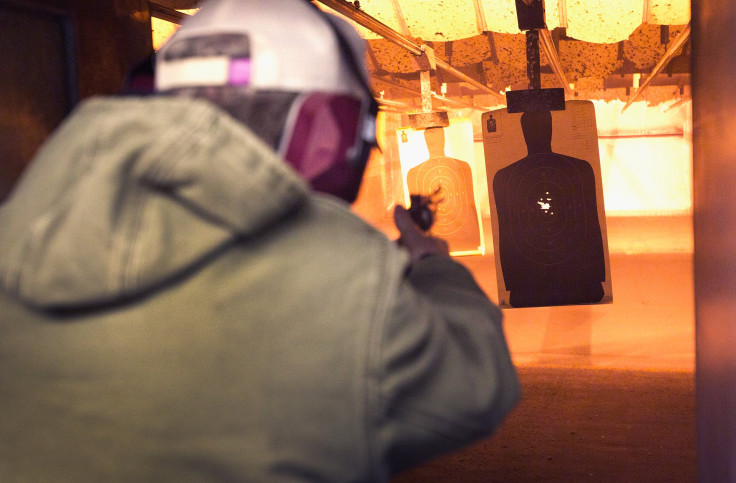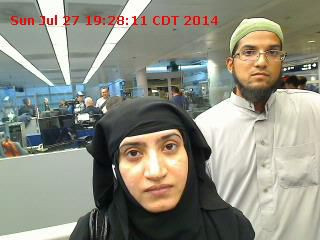San Bernardino Massacre Means Brisk Business For Shooting Ranges

In the days and weeks before Syed Farook and Tashfeen Malik stormed a holiday party with semi-automatic rifles and killed 14 of Farook’s work colleagues in San Bernardino, California, the couple took part in a beloved American tradition: blasting targets at a shooting range. But the revelation isn’t likely to dent the shooting range business, as the same citizens motivated to buy guns in the wake of the tragedy head to the ranges to practice firing them.
“We’re definitely seeing an increase in gun sales as well as training,” said Debbie Block, owner of Reno Guns & Range in Nevada, which sells firearms and merchandise in addition to maintaining an indoor shooting range and providing instructional classes.
“There’s a much bigger interest in personal protection,” Block said, citing growing attendance at courses in concealed-carry and home defense. “Our classes are filling up.”
'People Don’t Want To Be Victims Anymore'
Every mass shooting puts a harsh spotlight on the gun industry. But the Dec. 2 massacre in San Bernardino has brought attention to shooting ranges as well.
Wherever there are guns, there are ranges. As many as 18,000 facilities dot the 50 states, according to estimates from the U.S. Centers for Disease Control and Prevention. The business brings in $1.3 billion in annual revenue, according to market research company IBISWorld, and it's poised for growth of roughly 2 percent in coming years as a broader swath of Americans pick up guns and learn to use them.
Firearms sales have pushed higher in recent years, bolstered by fears of tighter gun-buying restrictions in the wake of gun-related tragedies such as the Aurora, Colorado, movie theater massacre in July 2012, and the Sandy Hook Elementary School shooting in Newtown, Connecticut, in December 2012.
Every bump in gun sales means a boon for gun ranges.
“Any time [President Barack] Obama opens his mouth you see more sales,” said Jeff Posuniak, who manages a large shooting range and gun shop in Michigan. Posuniak sees a combination of factors explaining growing gun sales and range use. Recent events, he said, have driven even more Americans to arm themselves.
“People are sick of what’s been going on, and people don’t want to be victims anymore,” Posuniak said, citing not just robberies and assaults, but also terror incidents. “It’s sad and unfortunate, but you know, it’s happened too many times on our soil.”
Suspicious Activity
No one raised any alarms at Riverside Magnum Range over the husband-and-wife team who eventually carried out the San Bernardino attacks. “How are you able to determine what somebody's intents are?” instructor John Galletta told ABC News.

Depending on which state you live in, buying a gun can entail waiting periods, background checks or mental health evaluations. But if you want just to rent a Luger and mow down some targets at the range, few laws will get in your way. That means felons convicted of violent crimes can practice shooting without any impediment, save for the better judgment of shooting range attendants.
Absent federal standards, those judgments can run the gamut. Block said Reno Guns & Range works closely with law enforcement and requires shooting range customers to show identification. “It’s prudent for a business in our line to be actively watching for issues,” she said. “But I don’t know if others do.”
National scrutiny fell on the shooting range industry last year, when a 9-year-old girl handling an Uzi lost control of the automatic weapon and fatally shot her instructor in the head. Some were shocked to learn that the shooting range, the Last Stop, was acting within the law with its policy of allowing children aged 8 and up to fire submachine guns.
The variability in range policies underscores the relatively fragmented nature of the industry. Unlike firearms manufacturers, where three companies together produce more than 40 percent of weapons for personal use, no single company accounts for more than 1 percent of the shooting range industry’s revenue.
In some states, gun laws regulate how many shooting ranges can operate per 100,000 residents. Other states, such as Kentucky and Florida, have few restrictions on how many ranges can operate.
Often, gun shops run their own indoor or outdoor ranges, giving customers a chance to test their wares. “People want to try something out before you buy,” said Jack Donald, who works behind the counter at Maryland Small Arms Range. “Do I want to buy a Glock, do I want to buy a Smith & Wesson?’ You can go out there and shoot them,” he said.
© Copyright IBTimes 2024. All rights reserved.






















